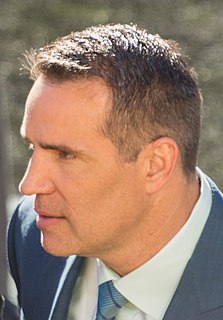A Quote by Karen Armstrong
The trouble with a lot of modern theology and a lot of modern thinking about God, is that we think of God a sort of being like ourselves, but bigger and better with likes and dislikes similar to our own.
Related Quotes
I definitely am very secure with my body and my likes and dislikes and the imperfections that some might call flaws. I'm like, 'Those are my thighs; it's just what it is.' I think a lot of that has to do also with... women being a lot more vocal about the fact that, you know, being flawless is false.
The God of the modern evangelical rarely astonishes anybody. He manages to stay pretty much with the constitution. Never break our by-laws. He's a very well-behaved God and very denominational and very much like one of us...we ask Him to help us when we're in trouble and look to Him to watch over us when we're asleep. The God of the modern evangelical isn't a God I could have much respect for.
Religion and anger has gone together a lot, historically. My father, being very religious and angry, was trying to reconcile the ideas of love and forgiveness with damage in his own heart. We historically create God in the image of someone who will redeem us, or someone who has damaged us. A lot of my imaginations of God was a projection of my own damage because of my father. God is good but he has a lot of expectations, of which I have failed -- just like my dad. But I don't think it's truthful to create God as a projection of either our damage or our altruism.
Is it our task to force the biblical doctrine of God to answer to modern culture, or (is it our task) to address modern culture with the biblical doctrine of God? If modern culture-or any culture-establishes the baseline for the doctrine of God, such a doctrine will certainly bear little resemblance to the God of the Bible.
You hear a lot about God these days: God, the beneficent; God, the all-great; God, the Almighty; God, the most powerful; God, the giver of life; God, the creator of death. I mean, we're hearing about God all the time, so we better learn how to deal with it. But if we know anything about God, God is arbitrary.
A lot of times, people think of Asian culture as some mythical world instead of modern people with modern occupations with modern problems, modern tools. Like, we're not all just talking Taoism and kung fu - some people are just trying to get over their breakup with their boyfriend, and they're Facebook-stalking.
Don't neglect your critical faculties. Remember that God is a rational God, who has made us in His own image. God invites and expects us to explore His double revelation, in nature and Scripture, with the minds He has given us, and to go on in the development of a Christian mind to apply His marvellous revealed truth to every aspect of the modern and post-modern world.
Religion is about God's truth, but none of us can grasp that truth absolutely, because of our own imperfections and limitations. We are only children of God, not God. Therefore, we must not attempt to fit God into little boxes, claiming that He supports this or that political position. This is not only bad theology; it marginalizes God.






































